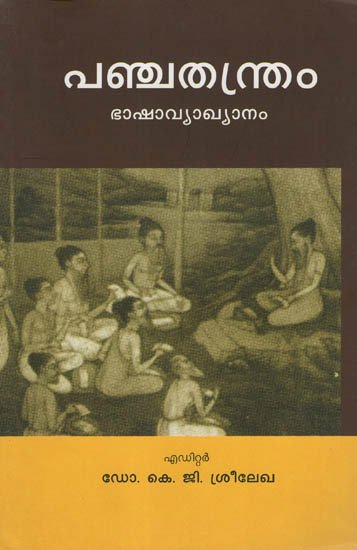Panchatantra [sanskrit]
by Dr. Naveen Kumar Jha | 2016 | 13,828 words | ISBN-13: 9788193077962
The Sanskrit edition of the Panchatantra referencing the English translation and grammatical analysis. Written by Vishnu Sharma and possibly dating as early as 1200 BCE, the Panchatantra (or Pancatantra) represents a collection of short stories teaching basic ethical values and moral conduct that was commonly practiced in ancient Indian. Alternative titles: Śrīviṣṇuśarman Pañcatantra (श्रीविष्णुशर्मन् पञ्चतन्त्र, Śrī-viṣṇuśarman pancatantra, श्री-विष्णुशर्मन्, Sri-visnusarman)
Verse 3.217
अनागतं यः कुरुते स शोभते स शोचते यो न करोत्य् अनागतम् ।
वने वसन्न् एव जराम् उपागतो बिलस्य वाचा न कदापि हि श्रुता ॥ २१७ ॥
anāgataṃ yaḥ kurute sa śobhate sa śocate yo na karoty anāgatam |
vane vasann eva jarām upāgato bilasya vācā na kadāpi hi śrutā || 217 ||
The English translation of Panchatantra Verse 3.217 is contained in the book The Complete Pancatantra: Sanskrit Text with English Translation by Dr. Naveen Kumar Jha. This book is not available online so in order to read the full text and translation you should buy the book:
Buy now! English translation by Dr. Naveen Kumar Jha (2016)
Glossary of Sanskrit terms
Note: This extracts Sanskrit terms and links to English definitions from the glossary, based on an experimental segmentation of verse (3.217). Some terms could be superfluous while some might not be mentioned. Click on the word to show English definitions.
Anagata, Yah, Kuruta, Shobhat, Shocat, Vana, Vani, Vasat, Eva, Jara, Upagata, Bila, Vaca, Kada, Api, Shrut, Shruta,
Analysis of Sanskrit grammar
Note: this is an experimental feature and only shows the first possible analysis of the Sanskrit text (Panchatantra Verse 3.217). If the system was successful in segmenting the sentence, you will see of which words it is made up of, generally consisting of Nouns, Pronouns, Verbs, Participles and Indeclinables. Click on the link to show all possible derivations of the word.
- Line 1: “anāgataṃ yaḥ kurute sa śobhate sa śocate yo na karoty anāgatam ”
- anāgatam -
-
anāgata (noun, masculine)[adverb], [accusative single]anāgata (noun, neuter)[adverb], [nominative single], [accusative single]anāgatā (noun, feminine)[adverb]
- yaḥ -
-
yaḥ (indeclinable relative)[indeclinable relative]ya (noun, masculine)[nominative single]yaḥ (pronoun, masculine)[nominative single]
- kurute -
-
kurutā (noun, feminine)[nominative dual], [vocative single], [vocative dual], [accusative dual]kuruta (noun, masculine)[locative single]kuruta (noun, neuter)[nominative dual], [vocative dual], [accusative dual], [locative single]√kṛ (verb class 8)[present middle third single]
- sa -
-
sa (noun, neuter)[compound], [vocative single]sa (noun, masculine)[nominative single]
- śobhate -
-
√śubh -> śobhat (participle, masculine)[dative single from √śubh class 1 verb]√śubh -> śobhat (participle, neuter)[dative single from √śubh class 1 verb]√śubh (verb class 1)[present middle third single]
- sa -
-
sa (noun, neuter)[compound], [vocative single]sa (noun, masculine)[nominative single]
- śocate -
-
√śuc -> śocat (participle, masculine)[dative single from √śuc class 1 verb]√śuc -> śocat (participle, neuter)[dative single from √śuc class 1 verb]
- yo* -
-
yaḥ (indeclinable relative)[indeclinable relative]ya (noun, masculine)[nominative single]yaḥ (pronoun, masculine)[nominative single]
- na -
-
na (indeclinable particle)[indeclinable particle]na (noun, masculine)[compound], [vocative single]na (noun, neuter)[compound], [vocative single]
- Cannot analyse karoty*an
- anāgatam -
-
anāgata (noun, masculine)[adverb], [accusative single]anāgata (noun, neuter)[adverb], [nominative single], [accusative single]anāgatā (noun, feminine)[adverb]
- Line 2: “vane vasann eva jarām upāgato bilasya vācā na kadāpi hi śrutā ”
- vane -
-
vana (noun, masculine)[locative single]vana (noun, neuter)[nominative dual], [vocative dual], [accusative dual], [locative single]vanā (noun, feminine)[nominative dual], [vocative single], [vocative dual], [accusative dual]vani (noun, feminine)[vocative single]vani (noun, masculine)[vocative single]
- vasann -
-
√vas -> vasat (participle, masculine)[nominative single from √vas class 1 verb], [vocative single from √vas class 1 verb]
- eva -
-
eva (indeclinable particle)[indeclinable particle]eva (noun, masculine)[compound], [vocative single]eva (noun, neuter)[compound], [vocative single]
- jarām -
-
jarā (noun, feminine)[accusative single]
- upāgato* -
-
upāgata (noun, masculine)[nominative single]
- bilasya -
-
bila (noun, masculine)[genitive single]bila (noun, neuter)[genitive single]
- vācā* -
-
vācā (noun, feminine)[nominative plural], [vocative plural], [accusative plural]vāca (noun, masculine)[nominative plural], [vocative plural]
- na -
-
na (indeclinable particle)[indeclinable particle]na (noun, masculine)[compound], [vocative single]na (noun, neuter)[compound], [vocative single]
- kadā -
-
kadā (indeclinable adverb)[indeclinable adverb]kadā (indeclinable interrogative)[indeclinable interrogative]kadā (indeclinable)[indeclinable]kada (noun, masculine)[compound], [vocative single]kadā (noun, feminine)[nominative single]√kad (verb class 1)[imperative active second single]
- api -
-
api (indeclinable preposition)[indeclinable preposition]ap (noun, neuter)[locative single]
- hi -
-
hi (indeclinable particle)[indeclinable particle]
- śrutā -
-
śrut (noun, feminine)[instrumental single]śrut (noun, masculine)[instrumental single]śrut (noun, neuter)[instrumental single]śrutā (noun, feminine)[nominative single]√śru -> śrutā (participle, feminine)[nominative single from √śru class 5 verb]
Other editions:
Also see the following editions of the Sanskrit text or (alternative) English translations of the Panchatantra Verse 3.217
Pancatantra of Visnusarman
by M. R. Kale (2015)
Panchatantra in Simple Sanskrit
by Dr. Vishwas (2016)
Panchatantram (Telugu)
by Tadanki Venkata Lakshmi Narasimha Rao (2020)
Published by J. P. Publications, Vijayawada; Throughout black & white Illustrations; 9788192053851.
Buy now!Preview of verse 3.217 in Telugu sript:
అనాగతం యః కురుతే స శోభతే స శోచతే యో న కరోత్య్ అనాగతమ్ ।
వనే వసన్న్ ఏవ జరామ్ ఉపాగతో బిలస్య వాచా న కదాపి హి శ్రుతా ॥ ౨౧౭ ॥
Panchatantram Bhashavyakhyanam (Malayalam)
by Dr. K.G. Sreelekha (2010)
Published by the University of Kerala.
Buy now!Preview of verse 3.217 in Malayalam sript:
അനാഗതം യഃ കുരുതേ സ ശോഭതേ സ ശോചതേ യോ ന കരോത്യ് അനാഗതമ് ।
വനേ വസന്ന് ഏവ ജരാമ് ഉപാഗതോ ബിലസ്യ വാചാ ന കദാപി ഹി ശ്രുതാ ॥ ൨൧൭ ॥
The Panchatantra Stories (Tamil)
by P. S. Aacharya (2017)
Published by Narmadha Pathippagam, Chennai.
Buy now!
Panchatantrer Galpa (Bengali)
by Children's Book Trust (2014)
Throughout color Illustration; 9788170112730
Buy now!Preview of verse 3.217 in Bengali sript:
অনাগতং যঃ কুরুতে স শোভতে স শোচতে যো ন করোত্য্ অনাগতম্ ।
বনে বসন্ন্ এব জরাম্ উপাগতো বিলস্য বাচা ন কদাপি হি শ্রুতা ॥ ২১৭ ॥
Panchatantra in Gujarati (Comic)
by Anant Pai (2013)
[શિયાળા અને રણશિંગ પંચતંત્ર] Published by Amar Chitra Katha; Throughout Color Illustrations; 9789350853115
Buy now!Preview of verse 3.217 in Gujarati sript:
અનાગતં યઃ કુરુતે સ શોભતે સ શોચતે યો ન કરોત્ય્ અનાગતમ્ ।
વને વસન્ન્ એવ જરામ્ ઉપાગતો બિલસ્ય વાચા ન કદાપિ હિ શ્રુતા ॥ ૨૧૭ ॥
![Panchatantra [sanskrit] - book cover](/uploads/a/Pancatantra.jpg)






